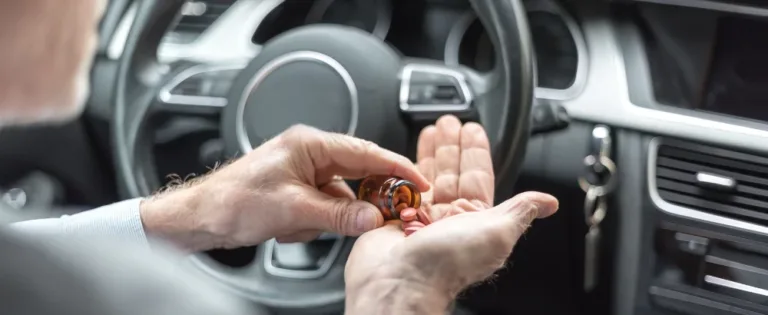A Michigan drug DUI (DUID) charge can result in severe legal consequences, including fines, license suspension, and potential jail time. State law prohibits driving while impaired by prescription medication. A drug DUI violates the same law (technically called “Operating While Intoxicated,” or “OWI” for short) as drunk driving
Defending against this type of criminal charge in Greater Detroit can involve challenging drug test accuracy, questioning impairment evidence, or exposing procedural errors in the investigation and/or arrest process. As genuine Michigan DUI lawyers, that’s exactly what my team and I do every day in the courts of Wayne, Oakland, Macomb, and the surrounding counties.
DUIs Related to Prescription Drugs or Illegal Substances
While many people associate DUIs with alcohol, Michigan law prohibits anyone from driving while under the influence of any substance that impairs their ability to operate a vehicle. These substances can include illegal drugs, prescription medications, and even over-the-counter drugs if they cause impairment.
Drug-related crashes are recorded separately from alcohol-related collisions. In 2023, there were 2,250 drug-involved crashes (with 256 fatalities), while there were 8,817 alcohol-involved crashes that same year. Driving while under the influence of illegal substances can lead to additional criminal charges.
Any detectable amount of illicit drugs can lead to what’s called an “Operating With the Presence of Drugs”, or “OWPD” charge. This is a separate offense buried in section 8 of the OWI law.
To be convicted of OWPD, the police do NOT need to show any impairment, but must only show that a person had any detectable amount of either a Schedule 1 substance, or cocaine.
You may think that lawfully obtained prescription drugs cannot be used to charge you with a DUID, but that’s mistaken. Around 40% of fatal crashes in Michigan involve a driver who was under the influence of drugs or alcohol, and those figures include people who were under the influence of certain types of prescription drugs.
Even when legally prescribed by a physician, medications like opioids, benzodiazepines, and sleep aids can cause drowsiness, slowed reactions, or confusion, which may be used as evidence of impairment. Painkillers, sedatives, and anxiety medications, in particular, can cause drowsiness that can lead to a DUID.
Detection of Drugs in the System
Breathalyzer tests detect alcohol in the system. To measure drug impairment, blood or urine tests are used. Michigan law allows law enforcement to request a chemical test if they suspect that a driver is under the influence of drugs. While a carefully calibrated breathalyzer used after a lawful stop can be used as evidence of a DUI, drug testing is often not as straightforward.
One reason for this is that there is no universal standard for being “impaired” by drugs. While a blood alcohol content of 0.08% defines intoxication, there is no standardized limit for THC. One reason for this is that the tolerance for substances like THC varies considerably from person to person. Some people have a very high tolerance for THC, while others may be sensitive to the psychoactive effects of THC.
Many substances, including marijuana, can remain in the bloodstream for days or weeks, even when a person is no longer impaired, and certain medications and medical conditions can trigger inaccurate test results, which may be used as a defense in a DUID case.
How the Court Process Plays Out for a Drug DUI
As noted both alcohol and drug DUIs fall under Michigan’s operating while intoxicated (OWI) laws, but there are differences in how the criminal charges might play out in court. Prosecutors rely heavily on breathalyzer test results to prove that someone was intoxicated at the time of their arrest. The specific BAC can even determine what type of charge someone faces.
A DUID case requires blood or urine tests that can take longer to process and may require outside testimony to interpret. Another major difference is field sobriety testing. In alcohol cases, officers look for balance issues, slurred speech, and other classic signs of intoxication. In drug DUI cases, these tests are less reliable, especially if the driver has a medical reason for taking prescribed medication.
These and other key differences can lead to unique defense strategies for defendants. Depending on the facts, as Michigan DUI lawyers, my team and I may have good reason to challenge the accuracy of the drug tests. As with a DUI charge, the legality of the traffic stop matters as well. If the video shows that the driver appears normal, that could weaken the prosecution’s assertion that the defendant posed a danger to public safety.
FAQs
What Is the Difference Between a DUI and an OWI?
The actual legal term in Michigan for what everyone calls a DUI in Michigan is Operating While Intoxicated, or “OWI,” for short. OWI refers to operating a vehicle while under the influence of alcohol with a BAC of 0.08% or higher, under the influence of drugs, or with any detectable amount of a controlled substance. The OWI law includes other related offenses, such as OWVI (operating while visibly impaired) and OUID (operating under the influence of drugs).
What Are the Levels of DUI in Michigan?
Michigan categorizes DUI offenses based on impairment level and BAC. OWI applies to drivers with a BAC of 0.08% or higher or visible impairment. OWVI requires no BAC threshold but shows reduced driving ability. Super Drunk OWI applies to BAC levels of 0.17% or higher, carrying harsher penalties, including longer suspensions, higher fines, and mandatory treatment programs.
What Is the Difference Between a DUI and an OWI in Michigan?
Michigan does not recognize DUI as a legal term. Instead, the state uses OWI for cases involving a BAC of 0.08% or higher or drug impairment. OWVI applies when a driver shows reduced ability to operate a vehicle, even without a high BAC. OWI carries harsher penalties than OWVI, including longer suspensions, higher fines, and mandatory treatment programs.
Can You Get a DUI in Michigan for Marijuana?
Yes, Michigan law prohibits driving under the influence of marijuana, even though recreational use is legal. Unlike alcohol, there is no legal THC limit, so officers determine impairment based on observations and field tests. Any level of impairment can lead to an OUID charge. A conviction may result in fines, jail, license suspension, community service, and/or mandatory drug education programs.
Schedule Your Michigan Drug DUI Consultation Today
A drug-related DUI charge can lead to serious legal and personal consequences, even if no alcohol was involved. Michigan’s OWI drug laws are strict, and a conviction can affect your license, career, and future opportunities. Even if it seems like you have no way out, the right legal defense can provide a path toward a favorable outcome to your case.
The goal in every DUI case is to avoid as many of the legal penalties and negative consequences as possible. Never forget – success in a DUI case is best measured by what does NOT happen to you.
At Jeffrey Randa and Associates, we know how to fight DUID charges. With decades of experience, our team builds strategic defenses based on improper drug testing, officer errors, and medical conditions that may have affected your results. Contact our Greater Detroit office today and find out how we can help protect your rights and your future.
We always offer a for a free, confidential consultation, done over the phone, right when you call. We are very friendly people who will be glad to answer your questions and explain the DUI/OUID process.


